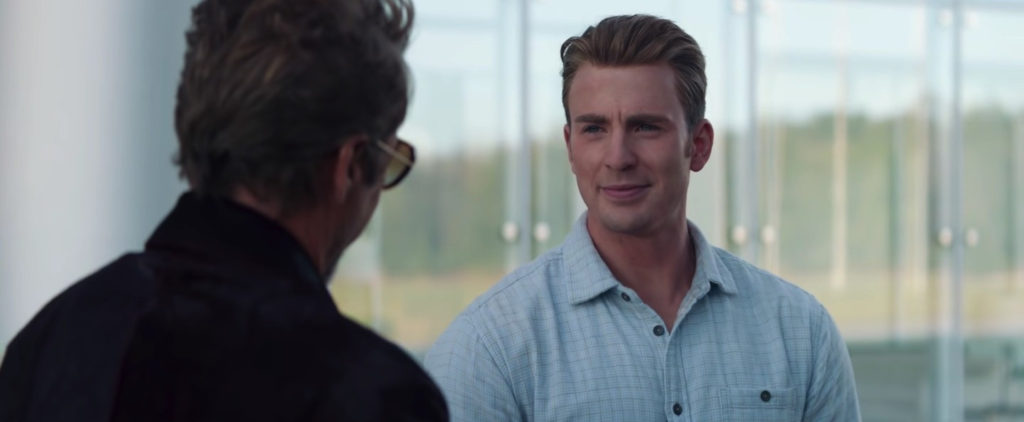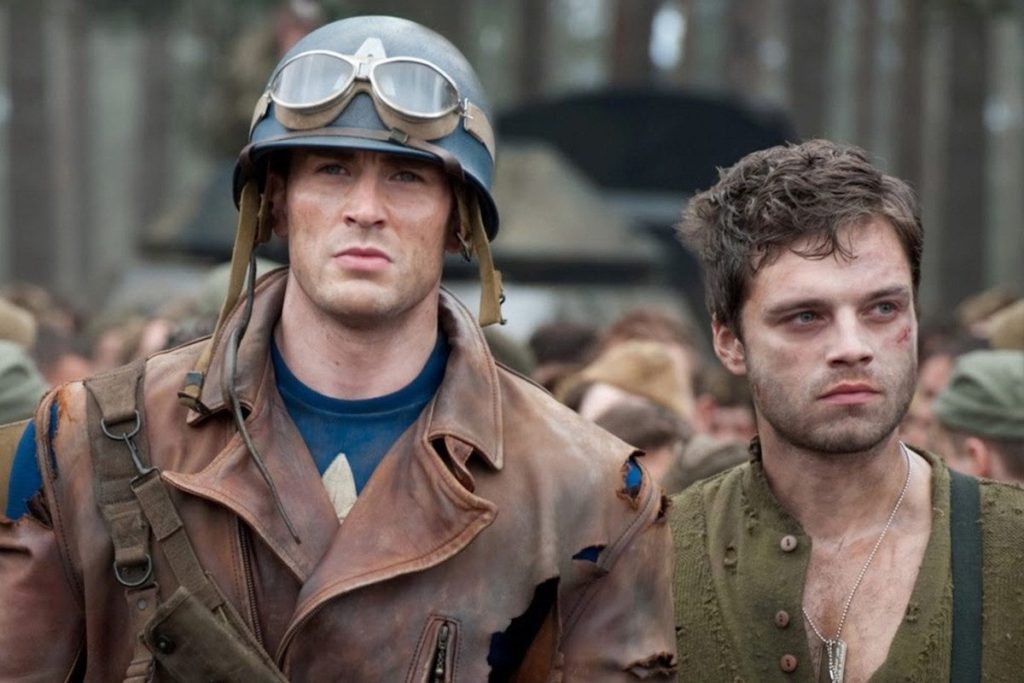Not all Slytherins…
First, you have to let go of the inherent bias against Slytherin that is found throughout the whole Harry Potter franchise. Put it aside and realize that yes, Slytherin qualities can do great harm if they are used for harm—but they can also do great good. As Dumbledore said, it is our choices that define us far more than our abilities. Captain America, as a symbol, might not seem like a Slytherin. I think that is why most people get so mystified by this notion. But we’re talking about the man behind the symbol, with all his strengths and flaws, Steven Grant Rogers.

He’s ambitious and wants to do great things.
From the very get-go, Steve longs for greatness. He grew up as a sick, impoverished kid living through the Great Depression. His father died. His mother worked hard to make ends meet and then she died, too. He always wanted something more. World War II comes along. Nearly every other young man over eighteen is being shipped off to fight, including Steve’s best friend, Sgt. James “Bucky” Barnes, who is not only tall, handsome, and a ladies’ man (I’m #stuckytrash ’til I die, but sadly this post isn’t about that), he’s also already an officer. To say Steve isn’t the least bit jealous would be foolish. He fantasizes about being a soldier, even a war hero, every time he watches one of those newsreels about the war or passes an enlistment station. Slytherins are known for their ambition and their drive to achieve their goals, which brings us to our next item.
He’s not above lying, cheating, or manipulating to achieve a goal he believes is worth it.
Steve’s not the goody-two-shoes guy that the Captain America image would have viewers believe he is. The most obvious examples in the MCU are lying on his enlistment forms in The First Avenger and then practically everything he does in Civil War. We know he stole vehicles, lied to his superior officers, disobeyed direct orders, and did other questionable things during World War II with the Howling Commandos. He even says to Nick Fury in The Winter Soldier, “Yeah, we compromised. Sometimes in ways that made us not sleep so well. But we did it so the people could be free.” In that quote lies the difference between a Slytherin whose goals are benevolent and those who, like Tom Riddle, do bad things because they want to or purely to advance their own interests. The common thread is doing “Whatever it takes” to achieve those goals. Now, where have we heard that before?
He holds others to high—sometimes impossible—standards.
This is a Slytherin trait that isn’t discussed too much, but it’s a pretty fundamental one for most serpents. The Sorting Hat says you’ll make “your real friends” in Slytherin. The members of this house are known for surrounding themselves with those they believe will help them succeed. Steve’s standards for those around him (and for himself) are high—sometimes impossibly so—because he wants people to be their best, ensuring the highest chance of success. It’s occasionally to the point that he can’t see past their human flaws or accept that they might not be wired the same way he is (Tony being the prime example). Steve can be obnoxiously self-righteous and make others feel inferior, whether he means to or not. But ultimately he does things for the right reasons—trying to help others—at least 90 percent of the time.

He can be selfish and stubborn.
That other 10 percent of the time, Steve has his own agenda. He wants things. He gets angry. He is a human with pride and an ego. He relishes the strength and power he has gained—you can see it when he teases Sam Wilson while they’re running in D.C. (“On your left.”) or when he drops the niceties and levels Batroc with a kick to the head on the Lemurian Star. And again, nearly everything he does in Civil War is for his own agenda because Bucky is his friend and Steve so desperately wants to clear his name and get him back.
He believes in individuals over institutions.
Steve says this outright to Tony at the end of Civil War, and it’s echoed throughout all the Captain America and Avengers films. He breaks rank and takes matters into his own hands in the war, then continually butts heads with authority in the Avengers (Fury, Tony). He is already distrustful of S.H.I.E.L.D.’s agenda when Project Insight is revealed, and then realizes that HYDRA infiltrated the organization long ago. He believes many of Tony’s systems are overkill and invasive. Steve isn’t interested in signing the Sokovia Accords because he doesn’t want to be at the mercy of a governmental power. He’s seen too many times what terrible things a corrupt system can do, so he places his trust and faith in the people who have proved themselves worthy, taking matters into his own hands in a very Slytherin-esque “If you want something done right, do it yourself” attitude.
His best friend is a Hufflepuff.
Every Slytherin needs a trusty Hufflepuff friend, and if you think Bucky Barnes isn’t a Puff, then maybe it’s time I write another essay. It might seem strange if you’re still holding onto the bias from the Potterverse, but Slytherins and Hufflepuffs actually make great matches. They balance each other and challenge each other to be better. Slytherin’s ambition makes them appreciate Hufflepuff’s loyalty and strong work ethic. Hufflepuff’s kindness pushes Slytherin to see the world in a more positive light. Slytherin will encourage Hufflepuff to stand up for themselves. Hufflepuff will help Slytherin stay grounded and remind them they don’t have to do it all on their own.

He feels lost without a purpose.
Ultimately, Steve is focused on achieving his goals. He feels lost without some big idea or mission to throw his energy into, and this is a very Slytherin mind-set. They can also get obsessive. Steve tells Sam that he’s not sure what he wants to do with his life or even what he likes doing, because he’s become so used to going from soldier to Avenger and not taking time to just be human—probably because he is afraid of being alone in a new century where he feels out of place in more ways than one. Even after the Snap, Steve forces himself to keep going by remaining goal-oriented. He leads a grief group and helps Natasha (a fellow serpent) with her efforts to find Thanos. The tasks are what keep them sane. Without a goal, a Slytherin can become listless and easily slip into the darker recesses of their mind.
To summarize, Steve Rogers is proud, ambitious, tactical, willing to do “whatever it takes,” and doesn’t blink at breaking rules to do so. He’s an independent thinker and will not blindly follow any rules, systems, or institutions. He’s resourceful, one of the leading Slytherin traits. He might not do everything he does for personal glory, but he also doesn’t mind being in the spotlight a bit and touting his abilities once in a while. He loves some drama here and there. He puts faith in those who have proven themselves worthy of his very high standards, and he can be a bit judgmental and harsh toward those who haven’t earned that trust yet. I believe that these factors are more than enough evidence to suggest that Steve Rogers is a Slytherin. Care to try and change my mind?


1 Comment
Masterfully written. I’d add that Slytherins rarely ask for forgiveness because they either think they’re right… or that they’ve already accepted the consequences of their actions – something a Gryffindor hero wouldn’t do because they believe that all they do is for the greater good. This is best exemplified for Steve when he says:
“I’m not asking for forgiveness… and I’m way past asking for permission.”